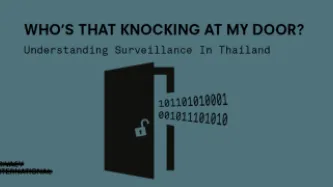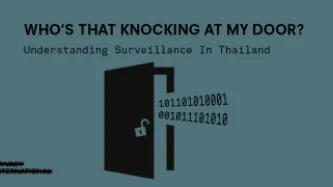Search
Content type: Impact Case Study
… is based on data exploitation. Big Tech companies such Google, Amazon, Facebook; data brokers; online services; … from abuses. What we did Early on, we demanded Amazon and Google to be more transparent about their data practices in … and sharing practices. We targeted industry giants like Google, Amazon, Facebook, Microsoft; popular business and …
Content type: News & Analysis
… pages, voice search recordings and translations from Google web history ad viewing text searches conducted with …
Content type: Long Read
… would “ remove whole tribes” . These two videos dominated Google searches and flooded Twitter, Facebook and YouTube … this occasion, targeting was done through judicious use of Google AdWords. This explains why paid-for ads for the campaigns emerged above the Google search results for many Kenyan election-related …
Content type: News & Analysis
… her credit card. While Naomi is waiting for her Uber, she googles restaurant options for her dinner meeting in …
Content type: Legal Case Files
… policy for mass surveillance of residents’ Facebook and Google use (16 June 2014) Privacy International files legal …
Content type: News & Analysis
… encompassing most major Internet service providers, such as Google, Facebook, Yahoo! And Twitter. An electronic …
Content type: Explainer
… by the private sector. This includes Twitter feeds, Google searches, and call detail records held by network … -- but does not provide a causal link. After much hype, Google Flu Trends, which relied on analysis of searches, …
Content type: News & Analysis
… wall posts after States complains of “subversive material”. Google hands over user data to law enforcement authorities …
Content type: News & Analysis
… future” by digital home assistants Amazon Echo and Google Home, through studying in detail their patent …
Content type: Long Read
… anonymous sites in particular started to dominate Google searches for dozens of election-related terms in the … Real Raila and Uhuru for Us campaigns relied on ad words in Google search and apparently targeted advertising on a range … sometimes bespoke political ads. [ Targeted advertising and Google Adwords are central to Harris Media’s campaigns .] …
Content type: Press release
… paid advertisements for two mysterious sites dominated Google searches for election-related terms and flooded … campaigns for President Kenyatta relied on ad words in Google search and apparently targeted advertising on a range …
Content type: Examples
… found clear examples of gender discrimination in the Google advertising ecosystem. In the early 1990s, a court … Inequality AI Poverty Social Media Surveillance Facebook Google Our campaign When Social Media makes you a target …
Content type: Examples
… than their more expensive counterparts made by. Apple and Google. At any given time there are millions of Android … to use them as their sole means of accessing the internet. Google's own figures showed that in 2016 only 3% of the … more examples Low income Security risk Inequality Poverty Google Android Apple Samsung Learn more Cyber Security …
Content type: News & Analysis
… direct line into records kept by internet companies such as Google, Microsoft and Twitter. In short, the US has the …
Content type: News & Analysis
… their much hyped psychometric profiling to Facebook and Google. Facebook, for example, offers its targeting tools , … amount of their campaign money into digital campaigning. As Google helpfully puts it, “voter decisions are increasingly …
Content type: Case Study
… in similar data collection, along with third parties like Google. Based on past behaviour it is feasible to foresee a …
Content type: Press release
… surveillance. We now have cell phones, fitbits, and Google, all of which have facilitated the increase of data …
Content type: News & Analysis
… of this narrative across the world. Other companies, like Google, Siemens and Microsoft – whose business involve the …
Content type: Case Study
… in similar data collection, along with third parties like Google. Based on past behaviour it is feasible to foresee a …
Content type: Case Study
… it from the Director of YouTube Advertiser Marketing at Google : “voter decisions used to be made in living rooms, …
Content type: Case Study
… the credit card company; a mobile wallet provider; Apple or Google. One example of this increasing, yet often hidden, …
Content type: Case Study
… can be discriminatory: a study of the ads displayed by Google on news articles, for instance, are far more likely … to show adverts on “executive-level career coaching” if Google believes the user is a man . In 2013, Harvard …
Content type: News & Analysis
… including some social media, blogs, and information through Google searches. It checks information like the device a … firm ZestFinance, and former Chief Information Officer of Google said in 2013, “We feel like all data is credit …
Content type: Long Read
… access to personality reports of their contacts from Google or social media and offers real-time suggestions for …
Content type: State of Privacy
… mobile applications include Facebook, Line, WhatsApp, Google Maps, YouTube, and mobile games and music. As of May …
Content type: News & Analysis
… by default, unlike any other company (for example, Apple, Google Chrome and Mozilla do not trust it). We do not know … they are navigating a potentially insecure website. Because Google Chrome defers to the operating system for certificate …
Content type: News & Analysis
… website. Most technology companies including Apple and Google choose not to trust the Thai Government certificate …
Content type: News & Analysis
… rather than an attempt to censor communications. In Egypt, Google was temporarily shut down as the government was …
Content type: Long Read
… share an office in this Johannesburg office park. Image: Google Maps. There is no evidence that any of the companies …
Content type: Long Read
… accounts; and its surreptitious interception of data from Google and Yahoo user accounts as that information travels …

























